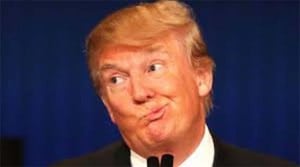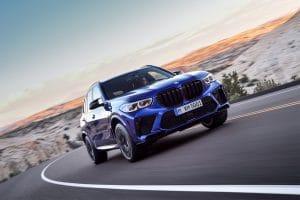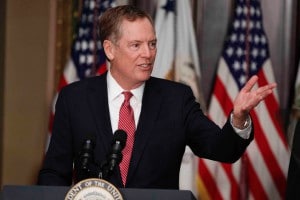
Maybe it’s not a good idea to be starting new trade wars? Pres. Trump appears to be backing away from new tariffs covering EU and Japanese-made autos and auto parts.
The Trump administration was expected to announce a decision on whether to impose new sanctions on European and Japanese autos and auto parts this week, but the decision apparently is going to be delayed, according to Washington sources.
The move for sanctions was authorized by a study completed earlier this year by the U.S. Commerce Department that concluded those imports posed a threat to national security. But President Donald Trump put off a decision in May, then imposing a new, 180-day deadline that was to have led to an announcement this week.
Exactly why the announcement on what could be new, 25% tariffs has been delayed is unclear, according to a report by Reuters, which quoted “five auto officials,” but the industry has actively opposed the threat of new duties. Meanwhile, the Trump administration remains tied up in efforts to strike a new trade deal with China, an announcement there having also been pushed back indefinitely.

Imports like the Toyota Supra could be hit by 25% tariffs, based on a Commerce Dept. study that concluded EU and Japanese auto imports threaten U.S. national security.
(Threat of auto tariffs could scuttle Trump’s trade deal with Japan)
According to Reuters, White House officials are asking foreign automakers to tally up the investments they have made in the U.S. market, a figure that is expected to run into the tens of billions of dollars.
Toyota alone last March said it would invest $13 billion in the U.S. during the next five years. Among other things, it is in the midst of erecting a new, $1.6 billion assembly plant in Alabama as part of a joint venture with Mazda.
Volkswagen, meanwhile, will hold a groundbreaking ceremony this week to mark the start of an $800 million expansion of its Chattanooga, Tennessee assembly plant. It will begin producing the first of at least two new battery-electric vehicles at the facility in 2022. In the process, the expansion is expected to create about 1,000 new jobs.
Daimler AG has said it will add at least 600 jobs at its own Alabama plant as part of a $1 billion expansion.
Daimler and other foreign and domestically owned manufacturers have stressed that new tariffs targeting Europe and Japan could backfire and actually hurt their operations – and cost American jobs – by limiting exports.

Manufacturers have warned that exports of American-made vehicles, such as the BMW X5 built in South Carolina, would face new trade barriers abroad.
The massive BMW facility in Spartanburg, South Carolina, has been the largest exporter of American-made vehicles in recent years. But it has seen the number of vehicles shipped to China sharply impacted by the U.S. trade war with that country. Ford and Daimler are among the others who have seen exports decline.
(Trump Says No Tariffs on Japanese Autos — For Now)
Auto industry officials have warned the administration, both publicly and privately, that new tariffs impacting Japan and the EU would compound the problem as those trade partners have signaled they would respond with new trade barriers of their own on American goods.
There have been signs that the administration is pulling back from the pro-trade war position Trump has espoused since his campaign for the White House got underway. Some observers say that reflects the fact that the administration has learned the difficulty of resolving such battles, despite the president’s claims that “trade wars are easy to win.”
But the recent announcements of new investments by some key European and Japanese automakers has certainly helped ease tensions, analysts have suggested.

U.S. Trade Representative Robert Lighthizer will begin negotiations on auto trade with Japan next April.
Meanwhile, Trump signed a limited trade agreement during a meeting with Japanese Prime Minister Shinzo Abe in September. Autos were not covered, but the two sides agreed to reduce tariffs on such things as American-made farm equipment and Japanese machine tools. U.S. Trade Representative Robert Lighthizer subsequently indicated discussions covering automotive goods would start in April 2020.
The issue of Japan’s automotive trade imbalance has been festering for decades and led that country to impose temporary and “voluntary” limits on exports to the U.S. during a brief period in the 1990s. Officials in that country have long insisted that the low demand for American vehicles in Japan reflects public tastes, rather than formal trade barriers.
Another sign that the Trump administration is pulling back from the brink of new trade wars came from U.S. Commerce Secretary Wilbur Ross, who oversaw the auto import study conducted under section 232 of a trade law Congress enacted back in 1962.
(China Moving to Offset Impact of Trump Tariffs and Jump Start Auto Sales)
“Our hope is that the negotiations we’ve been having with individual companies about their capital investment plans will bear enough fruit that it may not be necessary to put the 232 fully into effect, may not even be necessary to put it partly in effect,” Ross told Bloomberg Television earlier this month.
